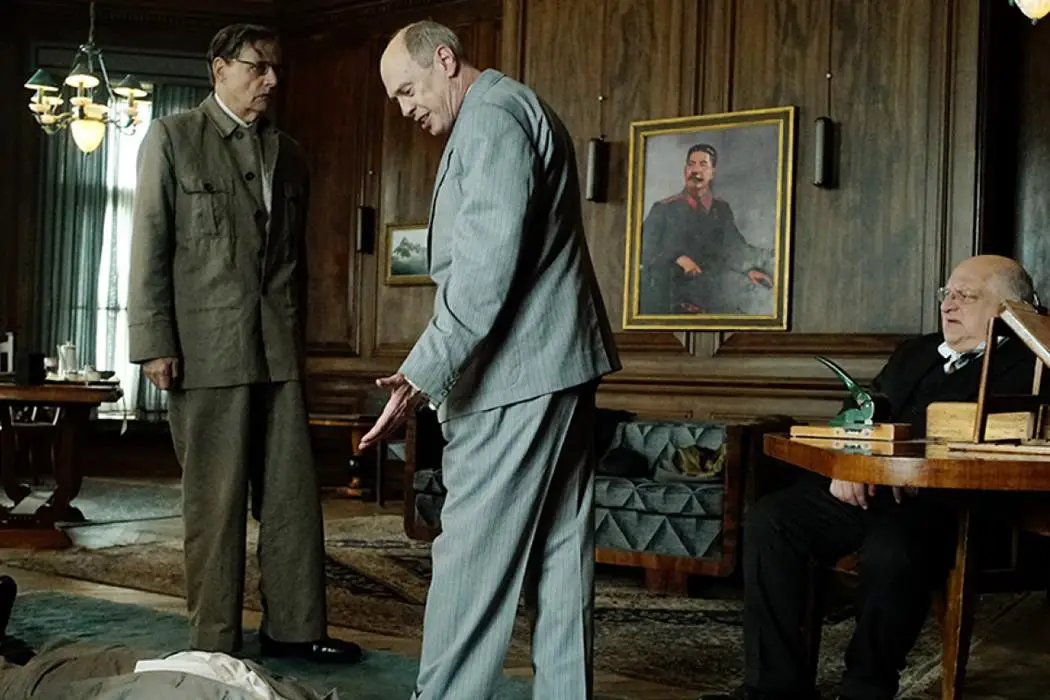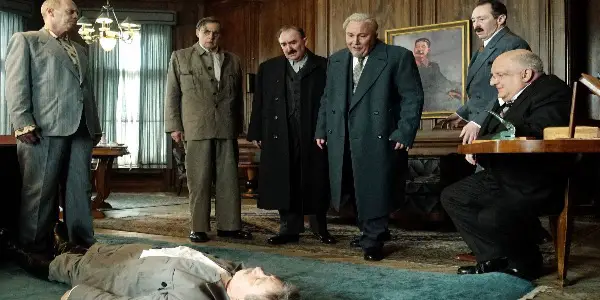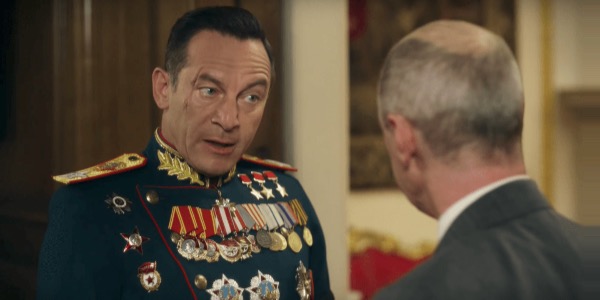THE DEATH OF STALIN: Chaos, Comedy & Communism

Alistair is a 25 year old writer based in Cambridge.…
As far as elevator pitches go, “The Thick of It in communist Russia” is undeniably one of the most intriguing, and despite a high concept, Armando Iannucci’s second big screen directorial effort The Death of Stalin neatly lives up to that billing. The foul mouthed inner workings of government, so hilariously skewered in his aforementioned sitcom and its US counterpart Veep, translate way better than expected to an authoritarian regime that takes pride in suppressing the rights of its citizens, to an often deadly degree. If there is a flaw with the film, it is that it never surpasses expectations—The Death of Stalin merely meets them, offering nothing that will surprise fans long acquainted with the work of the comedy maestro.
Power-Hungry Madmen
Set during the week surrounding the death of Soviet dictator Joseph Stalin in 1953, Iannucci’s film (adapted from a French graphic novel by Fabien Nury and Thierry Robin) depicts the delusional rush for power among his inner circle following his unexpected passing. Despite being an adaptation of preexisting source material, the film feels like a creation very distinctive to the comedic style of its director; insults fly faster than bullets, with a consistently farcical lack of ability among the characters to micromanage even the smallest occurrences in a snowballing political crisis.

Steve Buscemi stars in the lead role of Nikita Khrushchev, who would later become the leader of the Soviet Union—but here, his attempts to “reform” the union are belittled by the interference of Lavrentiy Beria (a superbly slimy Simon Russell Beale), as well as his inability to gain approval from Stalin’s children (Andrea Riseborough and Rupert Friend).
The communist party’s manifesto claims that following the leader’s death, leadership should fall to his deputy—here, Georgy Malenkov, played by Jeffrey Tambor, who makes the initial democratic decision to rule with the help of his council. Which would be a lot simpler if they weren’t constantly in-fighting, clueless as to whether they should progress with reforms that could win over the public, or stay on the deadly path of Stalin, which they are deluding themselves in to believing is popular, due to an eternal fear of their former leader.
In many ways, The Death of Stalin is an exceptionally timely satire. Despite being a period piece, the incessant squabbling within the council is a very blatant (and highly unintentional) metaphor for the ongoing Brexit negotiations, and Theresa May’s inability to unite her party due to cabinet plotting to undermine or overtake her leadership. Iannucci has frequently expressed that he doesn’t want to create a Brexit-related Thick of It special, due to how comically redundant that concept would be. Luckily, he has managed to convey the same sense of governmental hopelessness in a film entirely divorced from the concept of the European Union altogether.
A Hilarious Disappointment
With all this being said, despite the film’s often unrelenting hilarity, it has struggled to leave a lasting impression with me outside of individual moments. Due to the stacked ensemble cast, with a wide array of real life roles to fill the shoes of, several characters get lost in the mix—including the best character in the entire film, Soviet Red Army officer Georgy Zhukov, played with an absurd hilarity by Jason Isaacs.

From the moment we say hello to Jason Isaacs, roughly halfway through the film’s running time, he instantly proves himself to be the best thing onscreen; speaking with a broad Northern English accent (as does Stalin in the film’s earliest scenes), the character has a surreal hilarity that almost transcends the grounded, quasi-documentary style of Iannucci’s film. Iannucci’s series are known for the consistent quality of their ensemble casts—but here, putting Buscemi’s “straight man” front and center only makes the weirder comic elements in the margins stand out more, leaving me wishing the film’s focus had been on them the whole time.
The Death of Stalin has a very distinctive feel of a TV miniseries condensed to feature length in this regard, with the supporting characters never as richly fleshed out as the central council members. The televisual feel extends to the rather uncinematic visual palette of the film, in which the expansive interiors of Russian high society resemble a soundstage on the other side of Europe more than ever before. Neither of these factors necessarily detract from the laughs, but they do result in a finished product that’s more at home on the small screen than the big one, where the character-based comedy is likely to reward repeated viewings.
If the criticisms in my review are sharply outweighing the positives, it isn’t due to the film being poor—but rather a familiarity with Iannucci’s political comedy shtick that ensures there are few surprises, making it easier to look past the jokes and find the faults. Iannucci is a comic auteur, with a very recognizable style of documentary-inflected, potty-mouthed satirical storytelling; for audiences unaccustomed to this style, they will likely give The Death of Stalin higher praise as a result. I did laugh frequently, yet I can’t help but feel that this period satire is destined to live in the shadows of his widely acclaimed political sitcoms on both sides of the Atlantic.
The Death of Stalin: Conclusion
In a rather weak year for big screen comedy, The Death of Stalin can easily stake a claim as the year’s funniest film. However, in Armando Iannucci’s back catalog, this big screen outing ranks as one of his minor efforts—albeit one that still registers thanks to some memorable set pieces (including a Paddy Considine cameo as a stressed out radio producer given a task by Stalin himself), and consistently brilliant performances from the ensemble cast, even if they are given thankless roles to work with. One thing is for sure though: communism has never been funnier.
What are the best political comedies?
The Death of Stalin will be released in the UK on October 20th, with a US release date still to be announced. For international release dates, click here.
Does content like this matter to you?
Become a Member and support film journalism. Unlock access to all of Film Inquiry`s great articles. Join a community of like-minded readers who are passionate about cinema - get access to our private members Network, give back to independent filmmakers, and more.
Alistair is a 25 year old writer based in Cambridge. He has been writing about film since the start of 2014, and in addition to Film Inquiry, regularly contributes to Gay Essential and The Digital Fix, with additional bylines in Film Stories, the BFI and Vague Visages. Because of his work for Film Inquiry, he is a recognised member of GALECA, the Gay & Lesbian Entertainment Critics' Association.













